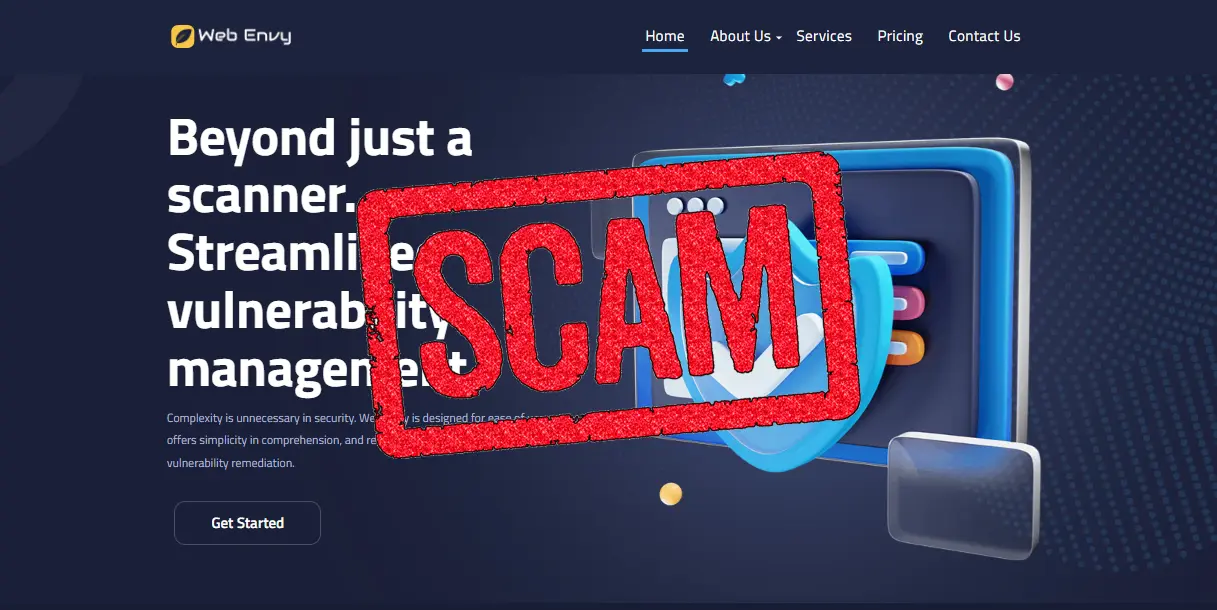Webenvy.io Invoice Scam: How to Identify and Stop This Fraud

What is the Webenvy.io Invoice Scam?
The Webenvy.io invoice scam starts with scammers pretending to be “Web Envy Solutions,” an SEO firm. They create a credible online presence to deceive businesses looking for digital marketing services.
They send around $100 invoices for bogus “SEO/link building” services never performed.
Scammers send out invoices for $98.57, claiming charges for “Cybersecurity and Digital Marketing” services. These invoices look legitimate but are for services never provided, hoping businesses will pay without checking.
To make the invoices seem real, scammers use official-looking details like account numbers and business addresses. These elements are crafted to reduce suspicion and prompt quick payments.
The small fee is designed to be low enough that businesses might pay to avoid hassle, thinking it’s easier than disputing a little payment.
How the Webenvy.io Scam Works
Scammers set up a professional website for “webenvy.io” to appear legitimate and lure businesses into their trap.
Thousands of fake $98.57 invoices are sent out to businesses, casting a wide net to catch as many victims as possible.
Call numbers go to automated messages giving victims the runaround and make them busy with a loop to a dead end, preventing them from getting real help.
Red Flags of the Webenvy.io Scam
Services Never Requested
Businesses receive invoices for services they never requested, a clear sign of a scam.
Identical $98.57 Fee
Every invoice charges the same amount of $98.5, which is highly suspicious and uncommon in legitimate billings of real businesses.
No Online Presence
Web Envy has virtually no website history, making it difficult to verify their legitimacy.
Fake Business information
The listed business address in Texas is actually an empty strip mall, another red flag indicating a scam.
Fake Team with AI-Generated Pictures
Webenvy.io appears to be an entirely fake operation with no actual employees or founders. Suspected use of AI-generated images and details rather than real people.

Scammy Psychology Behind $98.57 Fee
The $98.57 fee is low enough that businesses might find it easier to just pay than to investigate.
Many businesses pay to avoid potential late fees or penalties, even if they don’t recall the service.
Protecting Your Business
Verify All Invoices
Carefully look at any invoices you did not ask for before paying. Thoroughly research the company and make sure the services were actually provided to you before making a payment.
Report to Authorities
Report any suspected fraud from webenvy.io to the FTC, IC3, and your bank to help prevent further scams.
Fight for Refunds
If you’ve paid, act quickly to dispute the charge and seek a refund through your bank or credit card company.
Inform Your Team
Educate your staff about invoice scams and red flags, ensuring everyone is vigilant to prevent future fraud attempts.
Conclusion
Don’t let scammers take advantage of you and your business! By simple tactics like: sending fake invoices from a phony company, hoping you’ll pay the small fee without questioning. Be on the lookout for unsolicited invoices with identical low charges and suspicious details.
Protect yourself by staying vigilant. Always verify any invoice before paying, especially unsolicited ones. If it seems fishy, report it. Educate employees on spotting scams. Use tools like Scamminder’s AI to quickly verify online businesses before working with them. Stay alert and keep your money safe from scammers.




